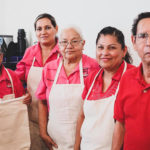Posted: 7/07/06
| David Beckmann, president of Bread for the World, underscores the connection between poverty and the global HIV/AIDS pandemic during the "Breaking the Silence: Compassion for an HIV Positive World" summit, held in conjunction with the CBF general assembly in Atlanta. (Photo by Mark Sandlin) |
AIDS summit challenges
Baptists to ‘break the silence’
By Carla Wynn
Cooperative Baptist Fellowship
ATLANTA (ABP)—Baptists and other Christians responded slowly and poorly 25 years ago to the advent of AIDS, but God has been in the trenches from the start, said David Beckmann, president of Bread for the World, a Christian advocacy group.
“God is in the midst of this,” Beckmann told more than 400 people gathered in Atlanta June 21-22 for an HIV/AIDS summit, dubbed “Breaking the Silence: Compassion for an HIV-Positive World.” The event was scheduled in conjunction with the Cooperative Baptist Fellowship general assembly.
“We know it may have taken some time to break the silence, but God has not been waiting 25 years,” said Beckmann, whose organization is a CBF partner.
The summit taught participants how to develop personal, congregational and larger responses to this growing health crisis.
The HIV/AIDS pandemic has changed the world, speakers agreed. With an estimated 40 million people worldwide currently living with AIDS and HIV, it is considered an international health crisis—too big to ignore, and yet so big it can be overwhelming to know how to respond, summit leaders said.
“The things we’re uncomfortable with, we don’t want to talk about,” musician Kate Campbell told a conference session.
What makes HIV/AIDS unsettling, Beckmann said, varies from lack of awareness about the disease to stereotypes and stigmas—particularly in the United States, where the first cases of the disease were spread mainly between homosexual men.
“God is not put off by the sexual character of this disease,” he said. “There are more important things at stake than that.”
Beckmann pointed to the connection between HIV/AIDS and poverty, arguing that fighting to alleviate global poverty can make a difference in curbing further spread of HIV/AIDS. Poor access to health care, lack of education about the disease and a sense of not being in control of one’s life all are byproducts of poverty that affect the prevention and treatment of HIV/AIDS.
Part of the challenge of responding to HIV/AIDS is combating ignorance or lack of awareness about the disease.
Thus, summit workshops ranged in focus from basic scientific information about the disease to listening to stories from people who live with HIV/AIDS.
To increase personal awareness, parti-cipants were urged to form relationships with people living with the disease. These relationships also would allow participants to be a supportive presence to those who may face some of the psycho-social consequences of the illness, including social isolation and fear.
“We need to reach out to the invisible and make them visible,” said workshop panelist Gretchen McDaniel, a Samford University nursing professor. “They want somebody to listen to them.”
One female speaker, who asked to remain anonymous, has lived with HIV 10 years. She told participants about the importance of support from friends and family—from whom she once hid her diagnosis because of fear of their response.
“They chose education over ignorance,” she said. “No one has ever turned their back on me.”
As one workshop discussed, spreading awareness could happen at seminaries, where future church leaders could be educated about the disease and the need for a local-church response. It wouldn’t be a new idea, said Sam Nixon of the Lott Carey Foreign Mission Convention, an African-American Baptist group. An HIV/AIDS class is required for students at a seminary in Zimbabwe, where the disease has a daily impact on the sub-Saharan African country, he said.
Responses to the HIV/AIDS crisis can come on several levels, participants learned. There is a spiritual response, where Baptists can pray for those infected and affected by the disease. Beckmann also challenged participants to get involved in their communities by working to prevent further HIV contraction among at-risk groups and by ensuring those with HIV have access to adequate medical treatment.
Beckmann also said personal response involves changing laws and systems that may limit the ability of governments or nonprofit groups to respond effectively to the AIDS crisis. For example, individuals can lobby for increased government spending on groups combating HIV/AIDS, he said. Engaging in Bread for the World’s targeted advocacy campaigns for global poverty alleviation also can have an impact, he said.
“Right now, God is achieving a great liberation in our world … and we can be part of it,” Beckmann said.
CBF Coordinator Daniel Vestal said Baptists have a spiritual duty to use their resources to address the crisis.
“What we do with human suffering and pain … is really the acid test of the Christian faith,” he said.














We seek to connect God’s story and God’s people around the world. To learn more about God’s story, click here.
Send comments and feedback to Eric Black, our editor. For comments to be published, please specify “letter to the editor.” Maximum length for publication is 300 words.